"You talk like Marlene Dietrich, you dance like Zizi Jeanmaire, your clothes are all made by Balmain, and there’s diamonds and pearls in your hair…" . Peter Sarstedt may have been a one-hit wonder, but his 1969 pop song, "Where do you go to (my lovely)?" passed into British popular culture in a flash, even if many of its chic references were lost on future generations. Zizi Jeanmaire, who died last Friday aged 96, personified the Paris of the 1940s, 1950s, 1960s, and beyond.
In her cabaret shows, the pixie-ish little figure with boy-cut black hair and fabulous legs would twerk with gigantic pink ostrich fans, and sing worldly songs about how love is merde. Her haircut, radical in 1949, was copied around the world, and Yves St Laurent took her as his muse for the theatrical side of his fashion. The Zizi style, all legs, laughter and feathers, inspired album covers and posters in an unmistakable, utterly Parisian iconography.
But Jeanmaire was also one of the 20th century’s game-changing ballerinas, epitomising the new postwar wave of modern French ballet. sought out by Rudolf Nureyev and Mikhail Baryshnikov, among others, dancing the hip young ballets of her husband, the choreographer Roland Petit, in his explosively successful companies Les Ballets des Champs-Elysées and the Ballet de Paris.
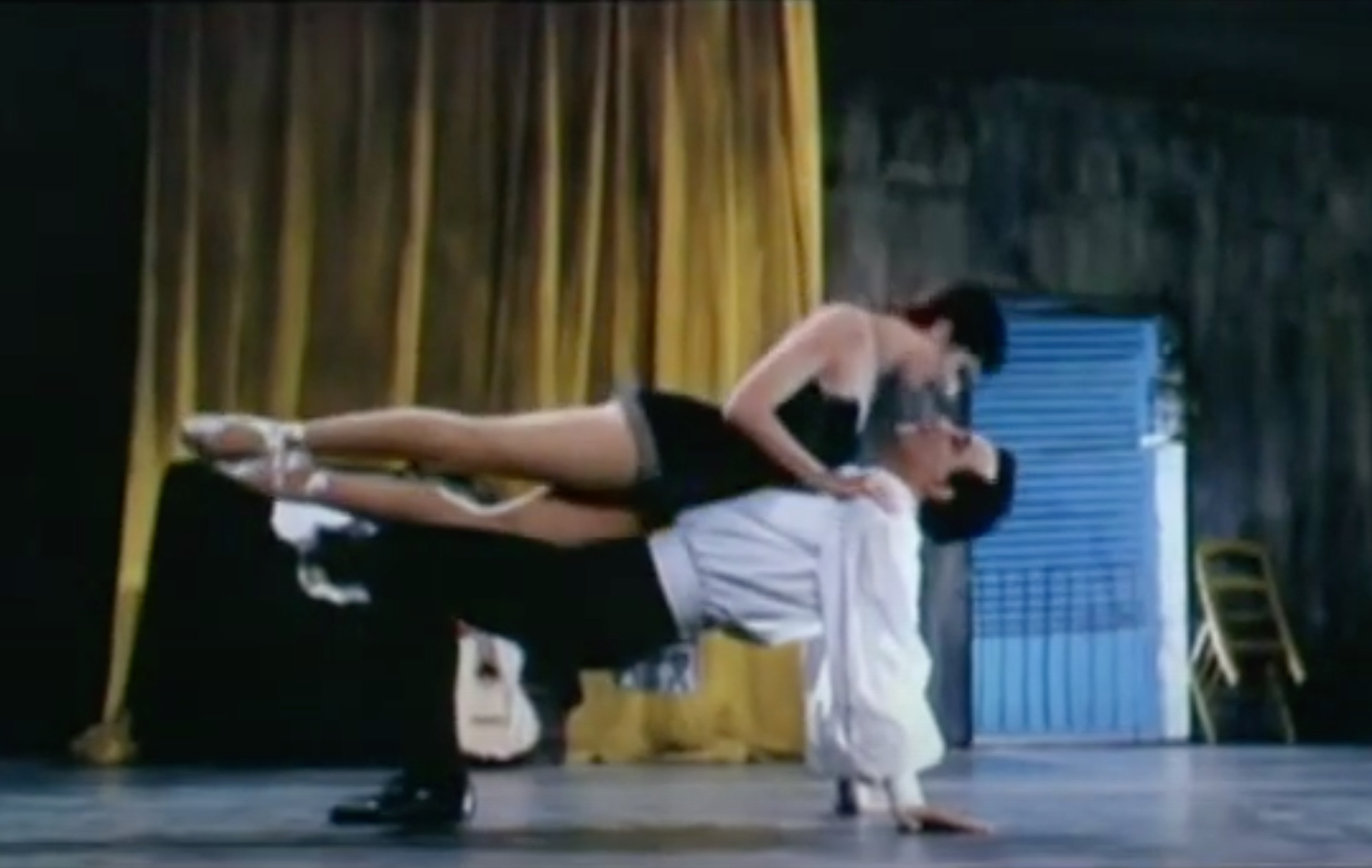
Two of the most memorable were his iconoclastic and sexy Carmen, premiered in London in 1949 – which made both his and Jeanmaire’s names as the ballet couple of the era (the British choreographer Frederick Ashton immediately said he felt old-fashioned) – and the brooding Forties melodrama of Le Jeune homme et la mort. (The pair pictured, above, in the film of Petit's Carmen)
But Jeanmaire wanted to be different, and taught herself to sing so as to scoop the lead in Petit's 1951 musical-comedy ballet, La Croqueuse de diamants ("I eat diamonds"). From then on she grew as famous for her gravelly singing as for her dancing. She would record a dozen or more albums, and starred in Petit's choreography for Irma la Douce, Folies-Bergère and Black Tights, celebrated on Broadway as well as in the great boîtes de nuit. Petit invented a new kind of revue for her in the Casino de Paris, sophisticatedly saucy, opulently costumed, with the benefit of France's superb songwriters and musicians. Saint Laurent designed countless extravagant costumes for her, usually a chic and classy bodysuit with a mad outburst of feathers framing her celebrated "truc" (thingamajig).
Born in 1924, Renée Jeanmaire (Zizi was her childhood nickname) and Roland Petit were adventurous soulmates who burst out of the junior ranks of the Paris Opera Ballet aged 18 in German-occupied Paris. At first they were just friends, but Jeanmaire became increasingly jealous of Petit’s independence and his many lovers, who included Margot Fonteyn. Finally, in 1948 she gave Petit an ultimatum: make me a ballet or I leave. She got the ballet, Carmen, and world fame overnight, and after some stormy years she got the man. They married in 1954, had a daughter, Valentine, and remained fierily devoted to each other until Petit’s death in 2011, aged 87.
In 1998 I interviewed Zizi Jeanmaire in Geneva, Switzerland, where the Petits had just moved to after decades in France. Fashions in dance had moved on, and Petit had had to leave his Ballet de Marseille after 26 years. "He told me, I’ve had enough, I’ll go, we leave France. So I said, OK." Zizi was 74, but still touring her own cabaret show.
"Do you always do what your husband says?" I asked. "Yes!" she said. Always saying yes to him would turn out to be the brilliant thing to do – for both of them.
The couple were renting while they searched for a permanent apartment, and all the souvenirs of her astonishingly florid (and astonishingly long) career were still packed in storage. We sat in the spartan space without a pink feather in sight and had tea. It would be nice to go back to London, she said, rather wistfully. London was where she was discovered, almost 50 years earlier.
I was attracted by him, by his taste. Maybe he did a bit of Pygmalion on me but I was looking for that
When you were nine, and at the Paris Opéra Ballet school, what did you dream of being?
What happened to me in London! That was my dream. I was doing my classes to be a classical ballerina, and I had a big example in front of me, and it was marvellous to arrive at that marvellous theatre, so big, with gold everywhere, and I dreamed of being a great dancer.
I first came to England with the Colonel de Basil company, which had all the Diaghilev repertory. We toured into London, it was 1946 or 47, just after the war. And I was prima ballerina with the company. We did Les Sylphides – that was not my cup of tea, it's beautiful ballet but not my type, pas tout à fait mon emploi. And Le fils prodigue, and I don’t know, many many things.
And finally I left the company because I was not very happy there. I went back to Paris and joined my husband, who was doing the Ballets de Paris de Roland Petit, and we began a season in France. And Margot Fonteyn came to dance Les Demoiselles de la nuit. And the second year, I asked my husband – who was not my husband at that time – to do me a big production. And finally he decided to do Carmen. And I was so happy. But scared, at the same time.
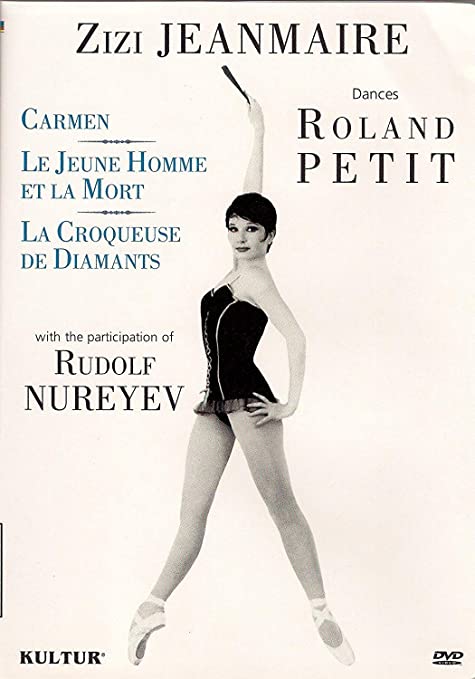 He said in a TV documentary that you weren’t his first choice.
He said in a TV documentary that you weren’t his first choice.
No, I was not... No [contradicts herself], I was his first choice, he had no choice, because I wanted to have a ballet or I was leaving.
Which classic roles did you like?
I didn’t care really, what I wanted was a creation for me. I did Coppélia, La Fille mal gardée, Sylphides ... ouf!... La Belle au bois dormant. But no, I wanted to have a creation.
Who were your idols as a child?
I loved very much then a beautiful dancer called Yvette Chauviré. She was my ‘petite mère’ (an older girl who would mentor a younger one), wonderful with me. She helped me and took me to her teacher, a marvellous man called Boris Kniaseff.
You have a very different image from Chauviré, she was the classical ballerina, you were so different.
What do you mean by classical? I don’t think my husband is something other than classical.
No, but his work is more about real emotions of people, like Kenneth MacMillan.
You mean, that MacMillan copied him, because he did it much before MacMillan. My god, he began in ’40... oh, la la.
I mean, classical ballets are about high, aristocratic emotions; Petit's works are about real people.
But that is a little bit fast. He's in the same lineage of Petipa, and he worked with Kochno, who came from Diaghilev, and so he is the continuity of the Ballets Russes. But with new things – in my opinion. When he was 18 he had created so many new things already, so when he arrived in London it was an évênement. Overnight it was in all the newspapers, from London to Paris and then New York, we were six months on Broadway with ballets. That never happened before...
So you weren't actually an iconoclast?
No.
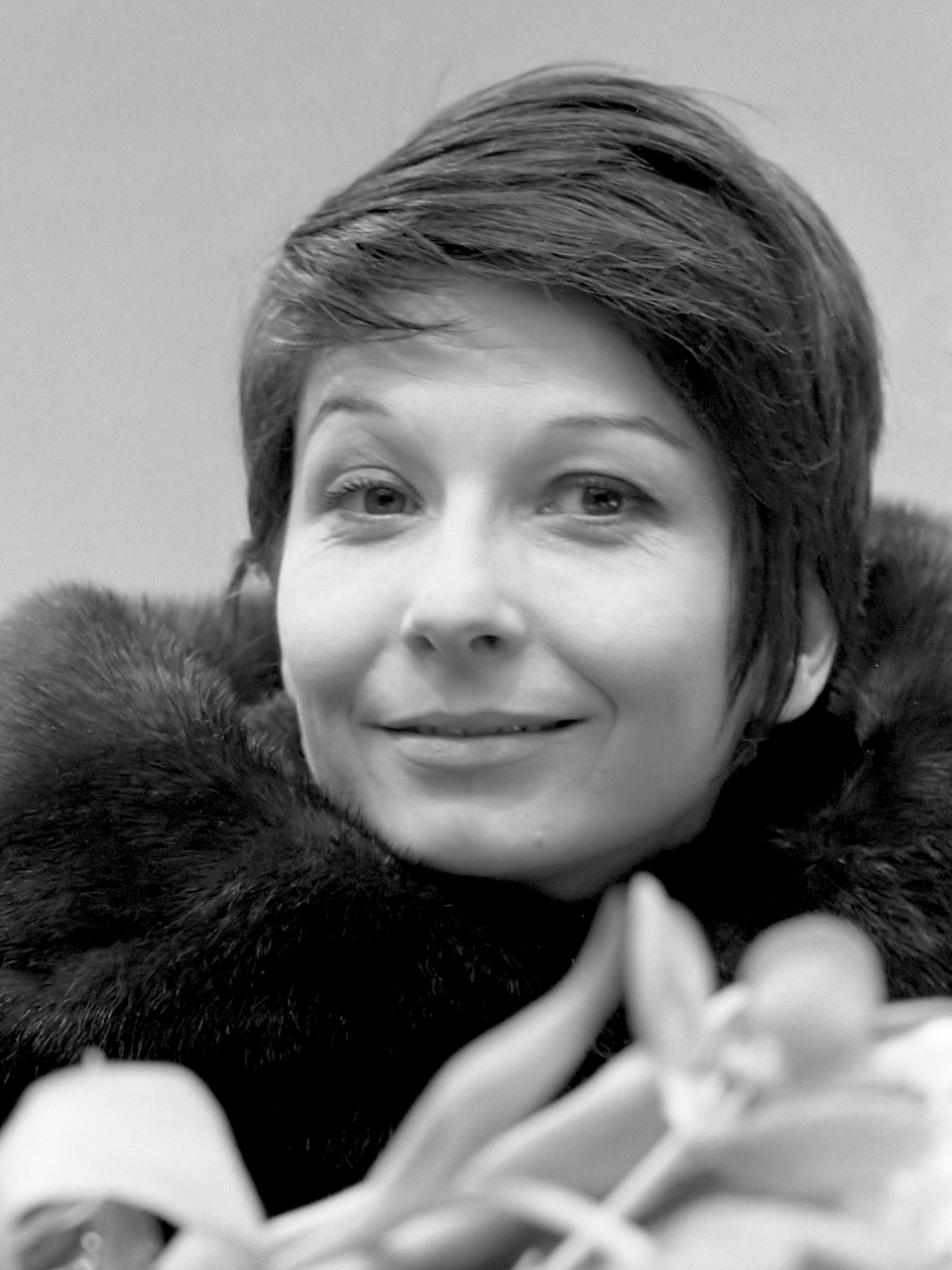 Yet you seemed to be, somehow.
Yet you seemed to be, somehow.
Mmmm. It's what I did. It depends what you do in your life, the way you do it. All my life I had the chance to have people, marvellous people around me, like... my husband, of course, Yves Saint Laurent, Clavé who did my costume for Carmen. I had always beautiful costumes. And Saint Laurent did for me, for 30 years, my costumes.
I was jealous of Fonteyn, because I loved him but he was taking a lot of care of her
Did you never wear a tutu?
No. Tutu c’est très beau, I love it, but I don’t think my destination was that kind of thing. [She smiles broadly.]
Did Carmen stereotype you?
Yes. if you discover finally (she snaps her fingers)… if you have the chance to find someone who can take something out of you or your personality, when you find that, then after of course you follow in that line.
When Fonteyn came on the scene, you have said he and she flirted a lot, you were jealous.
Well, I was jealous because I loved him already, but he was taking a lot of care of her, and she liked him very much. She came to do the first season, as I told you, so of course... it's for that that afterwards I told him, make me a ballet. Otherwise, I said, I will go. He said, ok ok, I will see what I can do. When he was 18, I loved what he did, and when we had discussions at the Opéra, he said to me, oh, you must have a creation. You can do all the ballets you want, because you have the technique, but the best thing in life is to have a creation.
Without him, what sort of career would you have had?
I was completely trained for classical, for Giselle, for Lac.
Did you do them?
No, because I left the Opera when I was 19, and he left six months after me, and he did his career. And I went to Monte Carlo to the Ballets de Monte Carlo.
That was brave. Why?
I wanted to try something else. I loved the Opéra, and I was very lucky to be there to learn, but at 18 I felt I wanted to do something else.
You didn’t dream of being Odette.
No, not really.
I can’t see you as Odette, too much fire.
But you have to have fire to do Odette. I am sorry, but it is not easy to do. Even to be a swan, you have to have fire inside. You have to have beautiful arms... look at Makarova, she did it beautifully and with fire. She wasn't evanouissante (wispy, faint).
How much like Carmen are you? She says, "l’amour est un oiseau rebelle", but you have been faithful for so long.
[She laughs.] No, it's more about temperament. I am not romantique – well, everybody is romantic inside – but my temperament is bouillante (boiling hot). And Carmen is a story of passion. In my nature I am not romantic either of approach or feelings. To do the big ballets, Giselle, Lac, I can see the attraction. Because what matters is to have beautiful things to dance. But it was not my desire.
 What about the idea of a ballerina doing cabaret? It’s not that pure, high culture you’re trained for.
What about the idea of a ballerina doing cabaret? It’s not that pure, high culture you’re trained for.
It depends how you think. It's not always "pure, high". Like sometimes people do ballet, and think they are very important, but it doesn’t mean anything. It depends how the work is made. In Paris they said, oh la la, a classical choreographer who is doing musicals... but it depends how you do it. In America, Balanchine did musicals, Robbins did musicals – nobody said, oh they're just doing shows.
And Frederick Ashton did revues. Was crossing over hard on your body?
I had a few accidents. I would go from high heels to ballet shoes in a musical, that was hard. I had a tendon injury, I was off for a year and a half. The doctor didn’t think I could dance again, but I wanted to and I did. [She was in her forties then.]
You have to have guts to go on stage, whatever you are doing.
La Croqueuse de diamants, for instance, I did in Paris and New York; I came on stage and sang for the first time.
Is performing everything to you? Is there life without performing?
It's very difficult to think of it. I stopped dancing on toe, not a long time ago, but one day I said, I stop, I now do just musicals.
[The phone keeps ringing, this time it is Carla Fracci on the line. Jeanmaire explains to me after the call.]
I had a Petit number with a chair and two partners. it was suggested by Fred Astaire for me, something he did with his sister on Broadway. One table, two chairs, and we danced on them. So my husband did this number for me with Luigi Bonino and it was a great success, it was a very good number. And Fracci, who is doing a television film in Italy now, asked if she could do this number, and it's very good.... so she was calling, and was so nice. She's wonderful. My husband did a creation for her two or three years ago, Cheri, with Massimo Murru.
Why do ballerinas love your husband's work so much?
Because he does big roles. You can play them, express yourself.
You must think yourself so lucky to have found him, such a professional and personal fit.
Yes, it’s true. I was attracted by him, by his taste, by his way of choosing people, painters, musicians, I like it when he takes a risk. Maybe he did a bit of Pygmalion on me. But I was looking for that, I was attracted by what he was doing, and my taste was for that.
Who were your favourites, the dancers you most admired and your friends?
Oh la la la... Moi, j’adore... but I like them because they are good dancers. For instance, I love Fracci, I love Altynai Asylmuratova - she is a wonderful dancer - I loved Baryshnikov, he was magnificent; Nicolas Le Riche, Murru. Whatever appeared to me and put me in extase. (Baryshnikov and Jeanmaire, below right, in the 1980 film of Petit's Carmen)
 Do you watch much dance for pleasure?
Do you watch much dance for pleasure?
I’ll watch when I like it.
Modern?
Yes, but I am not open to everything... I can watch Martha Graham.
Pina Bausch?
Yes, of course, she has talent.
Merce Cunningham?
Mmmm.... yah.
Too abstract?
No. Abstraction doesn't put me off. But I need some sensation, and a beautiful one. Not ugly. J’aime que ça me parle.
Your husband has been making his career at a time when the trend was increasingly for modern work – has he been concerned?
No, not all.
In Britain that's the impression.
It’s because he hasn’t been performed in England. When he had the company, he couldn’t go to England because they couldn’t give the money, at all. You can’t afford by yourself to bring a company of 50 years. For 25 years it is now impossible. Japanese can give money, the Italians, the Germans, but you can’t go into London. And in America, the same. Many times he said, if only I could go to London. But he couldn’t afford it. And the English, they didn’t ask my husband to come and choreograph something at Covent Garden. [She is animated and cross.] Ils sont très très closes, comme ça. Maybe 40 years ago he did something for de Valois, it was a long time ago.
Kenneth MacMillan perhaps occupied that dramatic space. Did he take a lot from your husband, did you feel?
No no, that's not the question. It's normal... my husband has a personality, MacMillan has his personality.
Have you seen his Manon?
C'est bien. c'est bien, Manon. C'est un bon ballet.
Not a big advancement on Carmen, though.
Not nouveau, non.
I would have thought after Carmen everything would have changed.
I think even before it, there was un nouvel air, a new approach to dance.
We here see something very French about your ballets with Petit.
Moi, je pense que... maybe a little. But it’s finally him, and in all modesty I think it’s more that he is international.
The sensuality seems French.
Well, yes, but sensuality can be English too, anywhere. When you arrive at a certain level, that disappears, the frontiers vanish.
When you went to Hollywood, was it a decision to leave ballet behind?
No no no, we were in Hollywood because the company was there. We knew we wouldn’t stay there. Finally we would continue practising and touring with the company. There was no break. It was just en plus, extra.
Who did you dance with there?
Well, I didn’t dance with Fred Astaire. I love him and that divine dancer who partnered him, Ginger Rogers, but I never did tapdance. No, Astaire asked for Roland to come and do Daddy Long Legs, but all we had was a conversation about the table and chairs number… Leslie (Caron) danced with him in the picture. I regret it very much; I would have loved to do it.
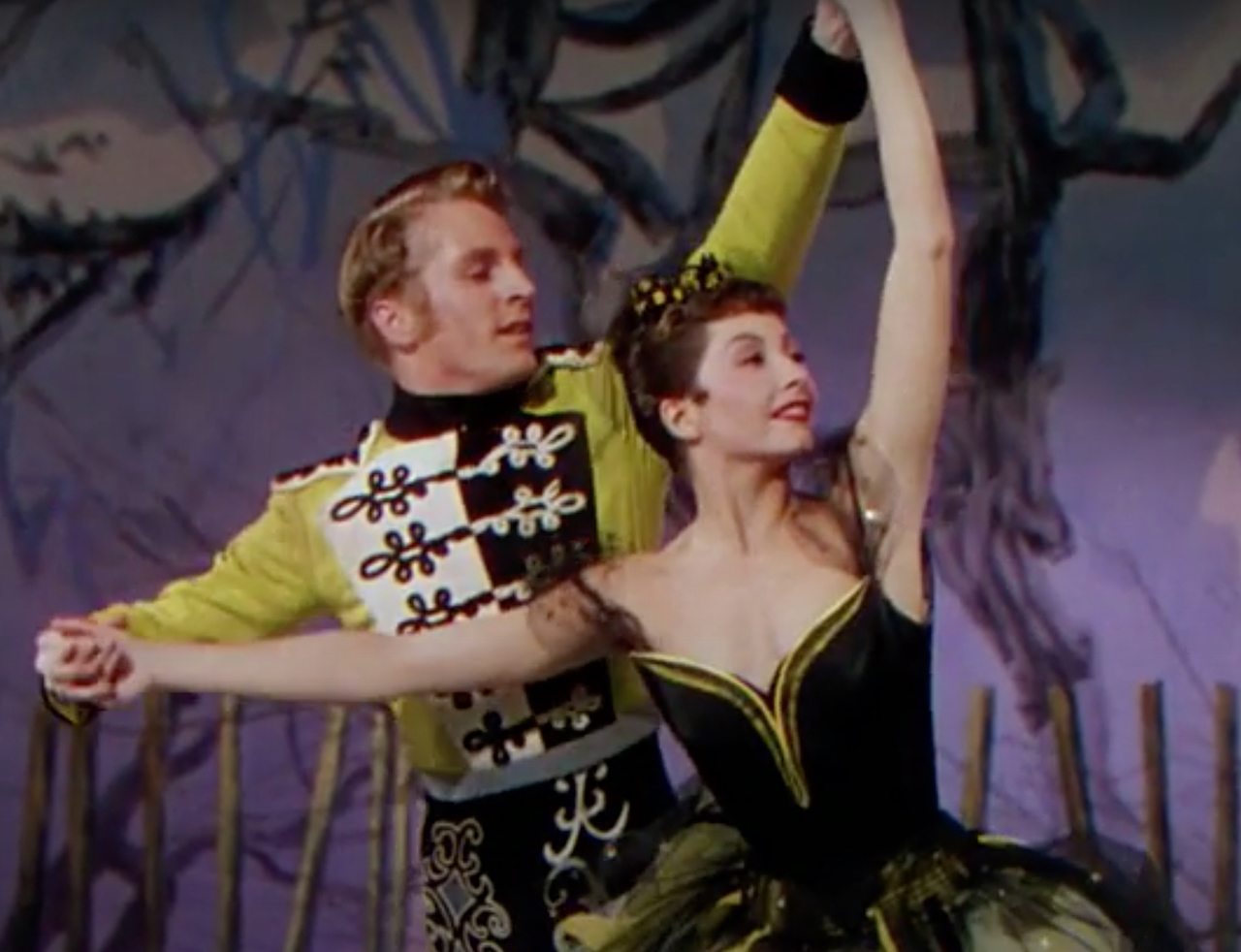 You danced with every great male star, Nureyev, Baryshnikov, Erik Bruhn (pictured left with Jeanmaire in the 1952 Danny Kaye film Hans Christian Andersen), Who was your favourite partner?
You danced with every great male star, Nureyev, Baryshnikov, Erik Bruhn (pictured left with Jeanmaire in the 1952 Danny Kaye film Hans Christian Andersen), Who was your favourite partner?
Ah, for certain it was my husband.
So loyal!
No, it’s true, it’s true. The way you look to someone is very important, not only to dance with them, but the feelings you have with them. And I had very nice feelings too, when we did Le Jeune homme et la mort with Nureyev too. He was, er, quite... difficult, but very nice. I had something with Luigi Bonino, with whom I did a lot of musicals. In showbusiness I love to dance with him. For instance, I would have loved to dance with Murru, because the way he look at the partner, you get the feeling you are really a woman. You have to feel that way [she laughs and shrugs], un partenaire qui vous met en valeur, a partner who makes you feel something. I can’t dance any more, unfortunately, but what can we do? Sometimes it’s sad, but... well, I was lucky to do the musicals, because I could go on. If I think, even now, I can’t go on the stage again, it's terrible. I hope, I still think I will go one more time on stage.
In the film, your husband says, he will die if you don’t go on stage.
Ahahahahah! [she cackles]. Because he knows I lerv it. He pushes me. And I told him the other day, I hope you will stop me... I don’t want to look.. like un zombie, so please tell me if you think one day it's enough. Well, I will feel it one day. But I hope to do again, quelque chose, one more spectacle. But the day I stop, will be terrible.
Which is the best bit of performing?
Being on the stage. C'est une déclaration.
Do you never have stage fright?
Having had one bit of success gives you confidence to weather the time it goes badly. You can’t always be sure that it will work, you just have to do it. At the moment of going on, you have made the decision to go on and do it. If that decision hasn’t been taken you don’t go on.
Do you dance with your husband at a nightclub?
[She looks shocked and is silent for a moment.] We never go to a nightclub! [Laughs.] We haven’t time.
 In the documentary, you appear to be very much in love still. Is this true or a performance?
In the documentary, you appear to be very much in love still. Is this true or a performance?
Non non, it’s true, otherwise… [she moues and shrugs] You can’t make a life like this without having a big... une vraie vérité affective. Long life together if you are not in love, c’est pas possible. You have to have the same intensity, to admire each other, it's an exchange of admiration. There have been couples who lived together all their lives in theatre and adored each other, I don’t think you can have a life without loving each other. If you have the same envies artistiquement, ça vous lie en plus. Even when people who live together are arguing.
Do you keep souvenirs of that Carmen era?
I didn’t keep things, but my husband did. I didn’t think, of course. But he kept the photos, my costume. And of course I kept my Saint Laurent dresses. I have about 15. The costumes are in storage. The Saint Laurent costumes were at Saint Laurent. The Carmen costume was in a cupboard. I would look to see if it was in good shape but I don’t have nostalgia. Sometimes I say if I could live again, I would relive the premiere of Carmen, and it would be marvellous. But I haven’t any real nostalgia. It’s done, and it was marvellous, and I was lucky.
As my husband continued creating, for me the fact that he continued to create new ballets for new dancers, it was as if it was for me. I go automatically forward because he draws me along with him. As long as my husband tells me continue, advance, I have no nostalgia.

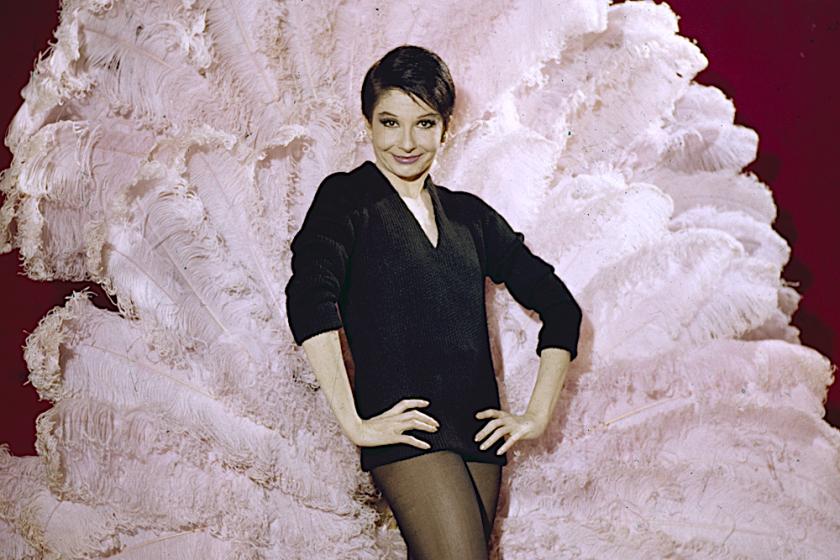






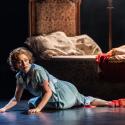





Add comment